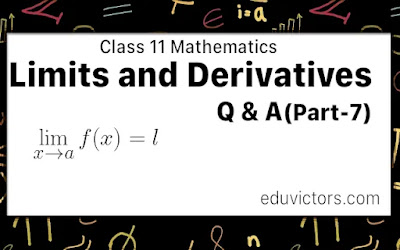CBSE Class 11 - Mathematics - Limits and Derivatives Part-7
Derivatives Using First Principle
In the previous post[Part-6], we learned about the Derivative of a function at a point. Let us focus on some important derivatives using the First Principle.
Theorem 1: From the first principle, we have
$\frac{\mathrm{d} (x^n)}{\mathrm{d} x} = nx^{n-1}$,
where n is a fixed number, integer or rational.
Proof: Let y = $x^n$ ...(i)
Let δy be an increment in y , corresponding to an increment δx in x.
Thus,
y+δy=(x+δx)ⁿ ...(ii)
On subtracting (i) from (ii), we get
y+δy - y = δy = (x+δx)ⁿ - xⁿ
$\frac{\delta y}{\delta x} = \frac{(x + \delta x)^n - x^n}{\delta y}$
$\therefore \frac{dy}{dx} = \lim_{\delta x\rightarrow 0} \frac{\delta y}{\delta x}$
∵ $ \delta x \rightarrow 0$ means $(x + \delta x)\rightarrow x$
= $\lim_{(x+\delta x)\rightarrow x} \frac{(x + \delta x)^n - x^n}{(x + \delta x) - x} $
∵ $\lim_{x\rightarrow a}\frac{x^n - a^n}{x - a} = na^{n-1}$
Thus $\frac{dy}{dx} = nx^{n-1}$
Or $\frac{d}{dx}(x^n) = nx^{n-1}$
Q1: Find the derivative of $x^9$
Answer:
We know that $\frac{d}{dx}(x^n) = nx^{n-1}$
∴ $\frac{d}{dx}(x^9) = 9x^{9-1} = 9x^8$
Q2: Evaluate the derivative of the given function:
s = $4.9t^2 $; t =1, t = 5
Answer:
s = $4.9t^2 $;
$\frac{ds}{dt} = (4.9)(2t^{2-1}) = 9.8t $
At t = 1, $\frac{ds}{dt} = (9.8)(1) = 9.8$
At t = 5, $\frac{ds}{dt} = (9.8)(5) = 49$
Theorem 2: The derivative of a constant function is zero.
Proof: Let f(x) = k (a constant function)
f'(x) = $\lim_{h\rightarrow 0}\frac{f(x+h) -f(x)}{h}$
f'(x) = $\lim_{h\rightarrow 0}\frac{k -k)}{h}$ = 0
Q3: For the function
f(x) = $\frac{x^{100}}{100} + \frac{x^{99}}{99} + ... + \frac{x^2}{2} + x + 1 $
Prove that f'(1) = 100f'(0)
Answer: We know that $\frac{d}{dx}(x^n) = nx^{n-1}$
f(x) = $\frac{x^{100}}{100} + \frac{x^{99}}{99} + ... + \frac{x^2}{2} + x + 1 $
∴ f'(x) = $\frac{100x^{99}}{100} + \frac{99x^{98}}{99} + ... + \frac{2x}{2} + 1 + 0$
∴ f'(x) = $x^{99} + x^{98} + ... + x + 1 $
Now f'(1) = 1 + 1 + ... +1 (100 times ) = 100
f'(0) = 1
∴ f'(1) = 100 × 1 = 100 × f'(0)
Hence f'(1) = 100f'(0)
In the next post, we'll see more examples of derivatives using the first principle.
👉See Also:
Ch5: Complex Numbers (Part 1) - Solved Problems
Ch 13 Limits and Derivatives (Q & A ) Part -1
Ch 13 Limits and Derivatives (Q & A) Part - 2
Ch 13 Limits and Derivatives (Q & A) Part - 3
Ch 13 Limits and Derivatives (Q & A) Part- 4
Ch 13 Limits and Derivatives (Q & A) Part-5
Ch 13 Limits and Derivatives (Q & A) Part-6
No comments:
Post a Comment
We love to hear your thoughts about this post!
Note: only a member of this blog may post a comment.